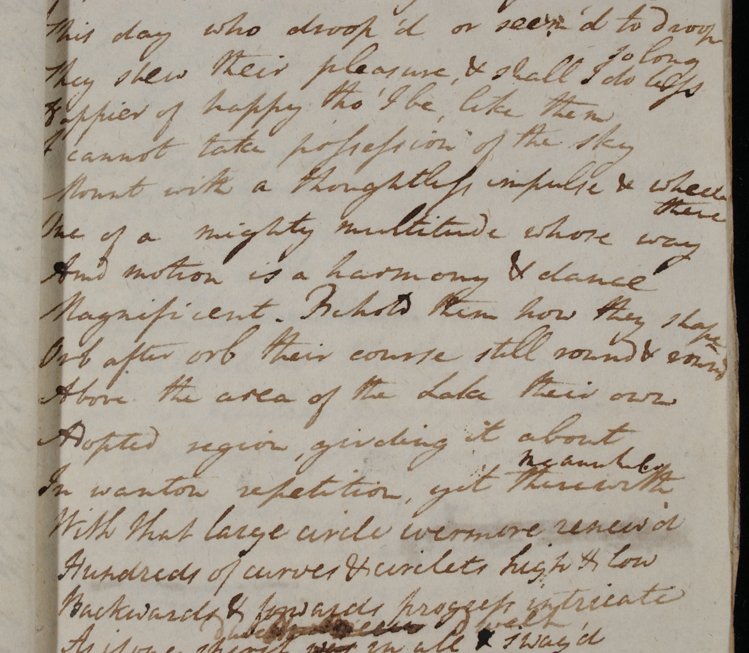Wordsworths in Forncett
Dorothy Wordsworth
William and Dorothy Wordsworth are usually associated with the Lake District, where they lived for most of their adult lives, but Dorothy spent an important part of her formative years here in Forncett.
William was born in 1770 and Dorothy a year later, but they were orphaned at a very young age, their mother died in 1778 and their father in 1783. As a result all five Wordsworth children were sent to live with different relatives and William and Dorothy spent most of their childhood years apart. In December 1788, Dorothy's uncle, Rev. William Cookson, who was newly married, moved to take up a new post as vicar of Forncett. Dorothy, aged 17, came with them and she lived at the rectory in Forncett St Peter until February 1794.

In Frances Wilson's biography "The Ballad of Dorothy Wordsworth", about the relationship between Dorothy and William, Wilson describes both the rectory and the church as follows:
'The red and black bricked rectory of Forncett St Peter, halfway between the towns of Norwich and Diss, is found at the end of a long and tree-lined gravel path. Set in an isolated spot above a small rise in the River Tas, it is a handsome, comfortable Queen Anne house complete with a Dutch gable. Next to it lies the church of St Peter and St Paul, with its spacious graveyard, its rooks, and cowslips and striking Anglo-Saxon round tower built in flint. The light sandy loam of Forncett St Peter is markedly different from the rocky terrains that Dorothy had been used to in Yorkshire and Cumberland. Entering East Anglia even from London, you feel the immediate strangeness of the place, the way in which the flatness of the land exaggerates perspective and elongates the horizon, allowing long but disquietingly uneventful views, transforming the scale of things so that the spires and trees are given a squat appearance. It is a curious thought that it was here, under the ever-expanding East Anglian skies that Dorothy and William both Northern to the core, should nurture their future relationship.'
The time in Forncett gave Dorothy her first real taste of rural living and undoubtedly left a lasting impression on her. She wrote frequently to William and to her childhood friend, Jane Pollard. Many of her letters survived and they tell us much about her life in Forncett. Shortly after her arrival here she wrote:
"Forncett is a little village, entirely inhabited by farmers, who seem a very decent kind of people. My uncle's house is very comfortable, and the gardens will be charming. I intend to be a great gardener, and to take care of the poultry, which we have in great abundance."
Compared to today, Forncett was really quite isolated in 1788. The railway had yet to come to Forncett and, in order to post her letters, Dorothy had to walk to Long Stratton, a 6 mile round trip. Soon after arriving at the rectory she set up a small school for local girls. This was, in effect, the first recorded school in the parish. She wrote to Jane:
"Did I ever tell you that I have got a little school? I have nine scholars. Our hours in winter are, on Sunday mornings, from nine till church time; at noon, from half-past one to three; and at night, from four till half-past five. Those who live near us come to me every Wednesday and Saturday evening. I only instruct them in reading and spelling; and they get off prayers, hymns, and catechism. I have one very bright scholar, some very tolerable, and one or two very bad."
Dorothy undoubtedly enjoyed her years in Forncett, she helped in the rectory and took long walks - particularly in the water meadows by the River Tas. However, she desperately missed the company of her brother. William was studying in Cambridge and occasionally came to stay at the rectory when they would walk the local lanes together.
"My brother William was with us in the depth of winter. You may recollect that at that time the weather was exceedingly mild. We used to walk every morning about two hours; and every evening we went into the garden, at four or half-past four, and used to pace backwards and forwards till six. Unless you have accustomed yourself to this kind of walking, you will have no idea that it can be pleasant; but I assure you it is most delightful."
One of their walks, described by Dororthy as "the favorite evening walk of my dear William and me" prompted William to write one of his early sonnets. So, whilst our normal picture of William Wordsworth is "wandering lonely as a cloud" in the hills above Grasmere, we should not forget that, in 1790, a much younger Wordsworth wrote the following poem in Forncett.
In November 1791 William went to France where he fell in love with a French woman, Annette Vallon, who, in 1792 gave birth to their daughter Caroline. Not surprisingly, Rev. Cookson disapproved of Wordsworth's love affair and the fact that it had produced a child born out of wedlock; William apparently never visited Forncett again.
Nearly two hundred years later another great poet would visit the village. This time it was Philip Larkin who was staying, at the time, with his friend and editor Anthony Thwaite at nearby Low Tharston. In his diary Larkin records the atmosphere of the location: 'I shall remember Forncett for a long time: the roaring trees, the exultant rooks, the flowering graveyard.'
Sources for this page include:
"Letters of the Wordsworth Family" Vol. I. Edited by William Knight, 1907.
"The Young Dorothy", M.J. Gates, in The East Anglian, Nov. 1954 (courtesy of Philip Yull)
Literary Norfolk (https://www.literarynorfolk.co.uk/forncett_st__peter.htm)

